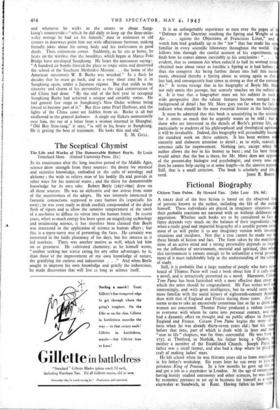The Life and Works of The Honourable Robert Boyle. By
Louis
The Sceptical Chymist
Trenchard More. (Oxford University Press. 21s.) .
IN its renaissance after the long inactive period of the Middle Ages, science drew strength from three sources : the desire for mystical and secretive knowledge, embodied in the cults of astrology and alchemy ; the wish to relieve man of his bodily ills and provide in other ways for his material wants ; and the thirst for demonstrable knowledge for its own sake. Robert Boyle (1627-1691) drew on all three sources. He was an alchemist and not averse from some of the secretiveness of the adepts. He was intensely interested in fantastic concoctions supposed to cure human ills (especially his own) ; he was even ready to drink cordials compounded of the dried flesh of vipers and to allow the sanative temperament of the tooth of a sea-horse to diffuse its virtue into the human frame. In recent years, when so much energy has been spent on magnifying technology and minimising science, it has therefore been claimed that Boyle was interested in the • application of science to human affairs ; but this is a topsy-turvy way of presenting the facts. He certainly was interested in the futile pharmacy of his days, but his interest in it led nowhere. There was another motive as well, which led him on to greatness. He cultivated chemistry, as he himself wrote, " neither seeking nor scarce caring for any other advantages by it, than those of the improvement of my own knowledge of nature, the gratifying the curious and industrious . . ." And when Boyle sought to improve his own knowledge and gratify the industrious, he made discoveries that will live r.s long as science itself. It is an unforgettable experience to turn over the pages of " Defence of the Doctrine touching the Spring and Weight of t Air . . . against the Objections of Franciscus Linus," and watch him lead gradually up to the " law " that has made his n familiar in every scientific laboratory throughout the world. 0 follows him through the careful account of his experiments finds how he comes almost inevitably to his conclusion : " . . evident, that as common Air when reduc'd to half its wonted ex obtained near about twice as forcible a Spring'as it had before ; thus the comprest Air being further thrust into half this nano room, obtained thereby a- Spring about as strong again as that last had, and consequently four times as strong as that of the comet Air." It seems strange that in his biography of Boyle Mr. Mo not only omits this passage, but scarcely touches on the subject it. It is true that a biographer must see his subject in such wide perspective that the salient features become merged in backgrciund of detail ; but Mr. More goes too far when he fails indicate what should be the most essential feature in the landsca
It must be admitted that this book is unsatisfying to the scienti for it omits so much that he urgently wants to be told • but those who are interested in the details of Boyle's private life, particularly to students of his philosophical and theological opinio it will be invaluable. Indeed, this biography will presumably beco the standard work on these subjects. It has been written In sincerity and elaborate attention to detail ; as to style, scarcely sentence calls for improvement. Nothing jars, except when author allows the bee in his bonnet to buzz; his best frie would admit that the bee is there, for Mr. ore does not appro of the present-day biologist and psychologist, and every now a then he cannot help saying so at some length—in the suavest mann Still, that is a small criticism. The book is scholarly and fills


























 Previous page
Previous page